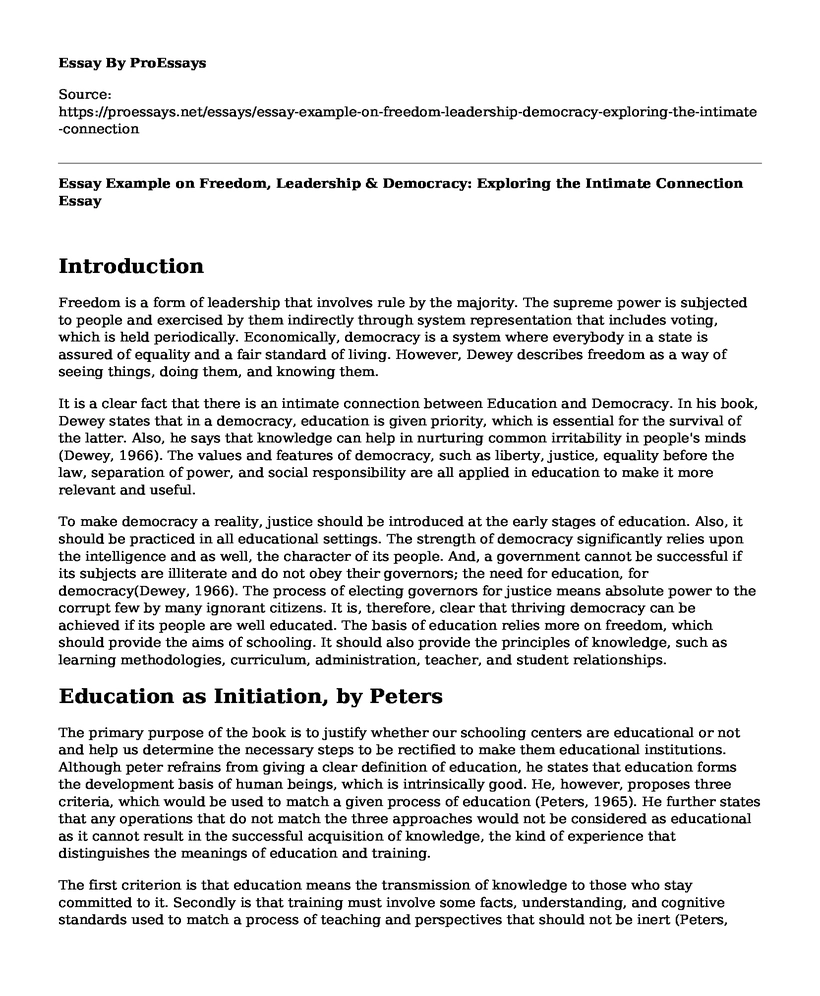Introduction
Freedom is a form of leadership that involves rule by the majority. The supreme power is subjected to people and exercised by them indirectly through system representation that includes voting, which is held periodically. Economically, democracy is a system where everybody in a state is assured of equality and a fair standard of living. However, Dewey describes freedom as a way of seeing things, doing them, and knowing them.
It is a clear fact that there is an intimate connection between Education and Democracy. In his book, Dewey states that in a democracy, education is given priority, which is essential for the survival of the latter. Also, he says that knowledge can help in nurturing common irritability in people's minds (Dewey, 1966). The values and features of democracy, such as liberty, justice, equality before the law, separation of power, and social responsibility are all applied in education to make it more relevant and useful.
To make democracy a reality, justice should be introduced at the early stages of education. Also, it should be practiced in all educational settings. The strength of democracy significantly relies upon the intelligence and as well, the character of its people. And, a government cannot be successful if its subjects are illiterate and do not obey their governors; the need for education, for democracy(Dewey, 1966). The process of electing governors for justice means absolute power to the corrupt few by many ignorant citizens. It is, therefore, clear that thriving democracy can be achieved if its people are well educated. The basis of education relies more on freedom, which should provide the aims of schooling. It should also provide the principles of knowledge, such as learning methodologies, curriculum, administration, teacher, and student relationships.
Education as Initiation, by Peters
The primary purpose of the book is to justify whether our schooling centers are educational or not and help us determine the necessary steps to be rectified to make them educational institutions. Although peter refrains from giving a clear definition of education, he states that education forms the development basis of human beings, which is intrinsically good. He, however, proposes three criteria, which would be used to match a given process of education (Peters, 1965). He further states that any operations that do not match the three approaches would not be considered as educational as it cannot result in the successful acquisition of knowledge, the kind of experience that distinguishes the meanings of education and training.
The first criterion is that education means the transmission of knowledge to those who stay committed to it. Secondly is that training must involve some facts, understanding, and cognitive standards used to match a process of teaching and perspectives that should not be inert (Peters, 1965). And finally, education should rule out some procedures to favor the learners; knowledge all around the World rests as the best appliance in realizing the most fabulous life. R.S Peters spells out the criteria one should conquer before claiming to be learned. Also, he states that educational institutions should initiate students into an intellectual life in pursuit of understanding and real-life applications. Knowledge and understanding, according to peters, is a way by which students can lead a justifiable and educated life as learned fellows.
Pedagogy of the Oppressed, by Freire
The author, Freire, used his teaching experience to illustrate the relationship and interactions between a teacher and his students. He emphasizes the need for a democratic relationship between the students and their teachers for a successful learning process. A teacher whose intention is to hold higher powers than his students and fails to own up to their imperfect nature and witlessness is at risk of drowning to a dreadlocked situation. Teachers, in this case, pretend to be knowledgeable than the students, thus holding education as a process of inquiry rather than the transmission of knowledge. He proposes a reciprocal relationship between the students and their teachers to create a democratic environment that permits equity in the learning process. It also encourages the students to be tolerant, open, and ready to learn from each other rather than suffer from the imposition of power from the superior end.
Flier explains that the banking method of teaching is insensible, as students are not encouraged to think critically. The teachers assume that their brains are empty, and they should deposit their knowledge into them. He states the banking method as a way of colonization. It is a brutal way to treat other human beings as they also have authentic forms of intelligence. The purpose of banking is characterized by fear, suspicion amongst one another, and the teachers' need to maintain higher power than his students. He further emphasizes the need to abandon the old approach of connecting with people through hierarchy rule but normalize the horizontal type of relationship.
References
Dewey, J. (1966). Democracy and education (1916). Jo Ann Boydston (ed.). The Middle Works of John Dewey, 9, 1899-1924.
Peters, R. S. (1965). Education as Initiation. Inaugural Lecture in the University of London 1963 repr. Authority, Responsibility and Education.
Freire, P. (1970). Pedagogy of the oppressed (MB Ramos, Trans.). New York: Continuum, 2007.
Cite this page
Essay Example on Freedom, Leadership & Democracy: Exploring the Intimate Connection. (2023, Apr 24). Retrieved from https://proessays.net/essays/essay-example-on-freedom-leadership-democracy-exploring-the-intimate-connection
If you are the original author of this essay and no longer wish to have it published on the ProEssays website, please click below to request its removal:
- Importance of the Global Women's Leadership Scholarship Programme
- Role of Law, Policy, and Evidence in Developing a Local Plan - Paper Example
- Paper Example on Constitutional Powers of the Presidency
- Global Health Diplomacy Paper Example
- Liberalism in Canada Essay
- Confidential Agreement: Leadership Behaviors Stimulating Positivity - Dissertation Example
- Bridging Gaps, Fostering Maturity, and Building Meaningful Relationships in Organizations - Paper Sample







